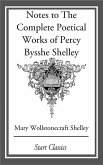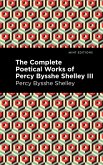In "Notes to the Complete Poetical Works of Percy Bysshe Shelley," Mary Wollstonecraft Shelley delves into the complexities of her husband'Äôs poetry, offering insightful commentary that enriches the reader'Äôs understanding of romantic literature. Combining analytical rigor with personal reflections, she unravels the thematic depth of Shelley'Äôs work, including his radical politics, exploration of nature, and profound engagements with humanity. Shelley's poetic style, characterized by emotional intensity and imaginative richness, is contextualized against the backdrop of the burgeoning Romantic movement, revealing both his genius and the turbulent era in which he wrote. Mary Wollstonecraft Shelley, renowned for her own groundbreaking work in speculative fiction, particularly "Frankenstein," was profoundly influenced by her intellectual milieu and her relationship with Percy Bysshe Shelley. Her acute sensitivity to the philosophical and emotional intricacies of his writing stemmed from their deep personal connection and mutual engagement with Enlightenment ideals. This unique perspective allows her to present Shelley's poetry not merely as isolated artworks but as interconnected meditations on the human experience. I highly recommend this scholarly work to readers who wish to deepen their appreciation of Percy Bysshe Shelley'Äôs contributions to poetry and the Romantic movement. Wollstonecraft Shelley'Äôs notes serve as both a guide and a lens, illuminating the multifaceted nature of her husband's thoughts and motivations, thus offering a richer engagement with his poetic legacy.
Dieser Download kann aus rechtlichen Gründen nur mit Rechnungsadresse in A, B, BG, CY, CZ, D, DK, EW, E, FIN, F, GR, H, IRL, I, LT, L, LR, M, NL, PL, P, R, S, SLO, SK ausgeliefert werden.









